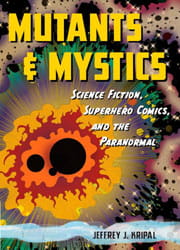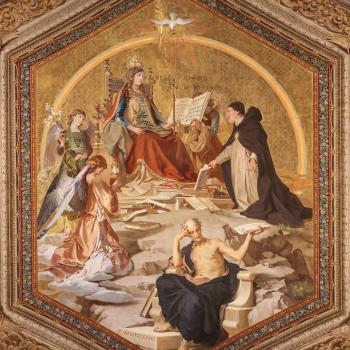 Now Featured at the Patheos Book Club
Now Featured at the Patheos Book Club
Mutants & Mystics
Science Fiction, Superhero Comics, and the Paranormal
By Jeffrey J. Kripal
Book Excerpt
Alienation
Superman Is a Crashed Alien
"I teach you," cries Zarathustra, "the superman! Man is something that shall be surpassed. What, to man, is the ape? A joke or a shame. Man shall be the same to the superman: a joke or shame. . . . Man is a bridge connecting ape and superman."
Friedrich Nietzsche, Thus Spoke Zarathustra
Man himself may well be a thinking and living laboratory in whom and with whose conscious co-operation [Nature] wills to work out the superman, the god. . . . Thus the eternal paradox and eternal truth of a divine life in an animal body . . . a single and universal consciousness representing itself in limited minds and divided egos, a transcendent, indefinable, timeless and spaceless Being who alone renders time and space and cosmos possible.
Sri Aurobindo, The Life Divine
By the turn of the twentieth century, the universe was not what it used to be. For one thing, it was getting embarrassingly big. In the early fifteenth century, the Europeans who would colonize what they mistakenly called the New World were still living in a medieval cosmos of profound meaning but relatively comfy proportions, with the sun, moon, stars, and planets all revolving around the earth, that is, around them. Already in the early twentieth century, the human being no longer lived in the center of the universe, but on a minor planet orbiting a minor (gulp, dying) star somewhere on the outer arm of an average galaxy, of which we would soon learn that there are billions.
The cosmos was now so unspeakably vast, its physics so utterly mindbending, that individuals were simply no longer capable of processing everything. A few elite astronomers and astrophysicists may have understood a portion of the math, but no one, no one, could now fathom the total vision, much less what it all meant. Hence the famous quip of J. B. S. Haldane that "the universe is not only queerer than we suppose, but queerer than we can suppose." There was more to it than queerness, though. The human being had, in a very profound sense, lost a home and, with it, a sense of belonging. Everything, literally everything, had become fundamentally alien.
Secret Icons: Superman's Occult Roots and Spider-Man's Alien Eyes
Superman, created by writer Jerome Siegel and artist Joseph Schuster, first appeared in June of 1938 in Action Comics #1. The two young Cleveland men, both avid science fiction fans, had created the figure back in 1933, but it was not until 1938 that they finally had a taker in National Comics (later DC Comics). The immediate success was breathtaking, with each issue selling upward of a million copies until, in effect, a new genre, a new industry, and a new subculture were all established. It was thus Superman who "literally created the comic book industry as an important publishing business."[i] It was also Superman who gave the superhero comic its archetypal form, that is, a costumed man or woman with a secret identity and superpowers.
The occult and sci-fi backgrounds of the Man of Tomorrow are well worth teasing out. Before Siegel and Schuster created Superman, for example, the same two young men created "Dr. Mystic: The Occult Detective." As we have it in this single two-page strip, Mystic, as he was called for short, joins his ally Zator, and together they flash along through the spirit world "at a speed greater than that of light itself" toward India and "the Seven." Dr. Mystic's face and build look more or less exactly like the later Superman. These same two pages also contain what Greg Sadowski has described as "comic books' first flying caped figure," that is, Zator.[ii] These, then, are some of the roots of the superhero genre: a mystic flying to India in the astral plane to do occult work.
This earlier explicit occultism was gently suppressed by Siegel and Schuster until it could only be gleaned from coded details like the notion that Superman was eventually said be an exile from another planet called Krypton (first introduced on January 16, 1939), which translates, if it were Greek (which it is), as the Hidden or the Occult. Put simply, Superman is a crashed Alien from the Occult.[iii] The accent, though, had clearly shifted from the Occult to the Alien, that is, from the mysticism to the science fiction, which is all to say from the mytheme of Orientation to that of Alienation.
Superman has attracted a great deal of criticism, some of it quite thoughtful, some of it grossly exaggerated. It is often claimed, for example, that the trope of the Superman was originally Nietzschean. It is then pointed out, correctly, that the Nazis loved Nietzsche's dream of the Übermensch—the Overman, Superman or, perhaps most literally, the Superhuman. This assumed conflation of the Superman and Nazism is then extended to the entire genre of superheroes, as if being a superhero is the same thing as being a fascist. The psychoanalyst Frederic Wertham, for example, consistently conflated Superman and fascism in his famous 1950s rant against comics, The Seduction of the Innocent. Numerous writers—from Frank Miller's The Dark Night Returns to Alan Moore's Watchmen—have since exposed the genre to similar withering critiques from within.




